
JASSS-THE JOURNAL OF ARTIFICIAL SOCIETIES AND SOCIAL SIMULATION
Scope & Guideline
Unraveling Complexities of Social Phenomena with Simulation
Introduction
Aims and Scopes
- Agent-Based Modeling (ABM):
The journal primarily emphasizes the application of agent-based modeling as a tool for simulating social interactions and behaviors. This approach allows researchers to model individual-level decisions and their aggregate effects on societal outcomes. - Social Simulation and Complexity:
A core area of focus is the simulation of complex social systems. The journal publishes studies that address how social dynamics emerge from individual interactions, including phenomena such as opinion dynamics, cultural change, and social norms. - Interdisciplinary Research:
JASSS encourages interdisciplinary approaches, integrating insights from sociology, economics, political science, and computer science. This broad perspective fosters innovative methodologies and theoretical frameworks for understanding social systems. - Policy Simulation and Evaluation:
The journal also highlights contributions that utilize simulations to evaluate policy interventions and their impacts on social behaviors. This includes modeling scenarios for crisis management, public health responses, and environmental policies. - Ethics and Methodological Reflections:
In addition to empirical studies, JASSS publishes theoretical discussions and critiques regarding the ethical implications of social simulations, as well as reflections on methodological advancements in the field.
Trending and Emerging
- COVID-19 and Public Health Modeling:
The ongoing relevance of the COVID-19 pandemic has led to a surge in publications focusing on public health modeling. Research in this area often utilizes agent-based models to simulate disease transmission dynamics and the effectiveness of policy interventions. - Opinion Dynamics and Polarization:
There is a growing interest in studying opinion dynamics, particularly in the context of social media and political polarization. This theme explores how individual opinions evolve and influence collective behaviors within societies. - Resilience and Adaptation in Social Systems:
Recent studies have increasingly focused on the resilience of social systems to external shocks, such as economic crises or environmental changes. This emerging theme examines how societies adapt and recover from disruptions through agent-based simulations. - Ethical Considerations in Simulation Research:
An increasing number of articles are addressing the ethical implications of agent-based modeling, particularly concerning data privacy, representation, and the potential societal impacts of simulation outcomes. - Interdisciplinary Approaches to Social Issues:
Research that integrates methodologies and theories from multiple disciplines is on the rise. This trend reflects a broader recognition of the complexity of social issues and the need for combined expertise to tackle them effectively.
Declining or Waning
- Traditional Statistical Models:
There has been a noticeable reduction in the publication of works relying solely on traditional statistical models. As agent-based modeling and simulation techniques gain traction, researchers are less likely to focus on classical statistical methods. - Single-Dimensional Models:
Research that employs overly simplified, single-dimensional models of social phenomena appears to be fading. The complexity of social systems requires more nuanced approaches, and studies that do not accommodate this complexity are becoming less prevalent. - Focus on Isolated Variables:
There is a declining trend in studies that examine isolated variables without considering the interplay of multiple factors. The journal increasingly emphasizes the importance of dynamic interactions and systems thinking in social simulation. - Descriptive Studies Without Simulation:
Descriptive studies that do not incorporate simulation methodologies are becoming less common. The field is shifting towards more integrative approaches that utilize simulations to derive insights rather than merely describing phenomena.
Similar Journals
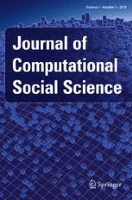
Journal of Computational Social Science
Fostering Collaboration at the Intersection of AI and SocietyThe Journal of Computational Social Science, published by SpringerNature, is a premier platform for interdisciplinary research at the intersection of social sciences and computational techniques. Since its inception in 2018, this open-access journal has garnered attention for its robust contributions to the fields of Artificial Intelligence and Transportation, holding a distinguished Q2 ranking in both categories as of 2023. Situated in Singapore, the journal embraces a wide scope aimed at exploring innovative applications of computational methods to address complex social phenomena, making it an essential resource for researchers, professionals, and students alike. With a growing impact and recognition—reflected by its Scopus rankings, notably at the 47th percentile in Transportation and 63rd in Artificial Intelligence—the Journal of Computational Social Science is dedicated to facilitating knowledge exchange and fostering collaboration in an era where technology increasingly informs social dynamics. Access to cutting-edge research in this field is vital for enriching scholarly discourse and advancing practical solutions to contemporary challenges.
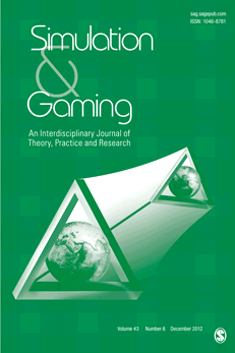
SIMULATION & GAMING
Bridging Disciplines with Engaging MethodologiesSIMULATION & GAMING, published by SAGE PUBLICATIONS INC, is a leading academic journal that explores the intersection of simulation and gaming within diverse fields such as business, social sciences, and computer science. With an ISSN of 1046-8781 and an E-ISSN of 1552-826X, this journal stands out in its commitment to advancing knowledge through high-quality research and innovative methodologies. As a testament to its influence, it is ranked Q1 in Social Sciences and Q2 in both Business, Management and Accounting, and Computer Science Applications, indicating its reputable position among scholars. Researchers, educators, and professionals will find valuable insights into the applications and implications of simulation and gaming, making it an essential resource for cutting-edge developments in these rapidly evolving domains. Access to its comprehensive archives allows for exploration of pivotal studies dating back to 1970, supporting the ongoing dialogue in this interdisciplinary area of research.

Computational and Mathematical Organization Theory
Advancing organizational insights through mathematical innovation.Computational and Mathematical Organization Theory, published by SPRINGER, is a prominent journal specializing in the intersection of mathematical and computational methodologies within organizational theory. With its ISSN 1381-298X and E-ISSN 1572-9346, this journal has established itself as a critical source of cutting-edge research since its inception in 1995 and continues to thrive with contributions spanning from 2005 to 2024. Noteworthy is its recognition in the 2023 quartile rankings, where it holds a Q2 status across multiple categories, such as Applied Mathematics, Computational Mathematics, and Decision Sciences, reflecting its broad analytical scope and the relevance of its findings to diverse fields. Furthermore, its Scopus rankings position it favorably within the academic community, underscoring its significant impact in Applied Mathematics (Rank #156/635), Computational Mathematics (Rank #59/189), and Modeling and Simulation (Rank #122/324). Although the journal is not open access, it provides crucial insights and methodologies that aid researchers and practitioners in enhancing organizational processes through mathematical and computational lenses. For scholars seeking to advance their understanding and application of these interdisciplinary approaches, Computational and Mathematical Organization Theory serves as an invaluable resource in the ever-evolving landscape of academic inquiry.
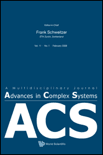
ADVANCES IN COMPLEX SYSTEMS
Advancing Knowledge in Multidisciplinary ComplexityADVANCES IN COMPLEX SYSTEMS is a prominent journal dedicated to the multidisciplinary exploration of complex systems, published by World Scientific Publishing Co. PTE LTD in Singapore. With an ISSN of 0219-5259 and E-ISSN of 1793-6802, the journal has been a vital platform for researchers and professionals since its establishment in 2004, contributing to the field of Control and Systems Engineering as well as a broader multidisciplinary audience. The journal currently holds a respectable Scopus rank of #240/321 in Engineering Control and Systems Engineering, placing it in the 25th percentile and reinforcing its commitment to fostering innovative research. Although it does not operate under an open access model, the advances published within are essential for those seeking to understand and harness the complexities of system interactions. As it converges towards its upcoming milestone in 2024, ADVANCES IN COMPLEX SYSTEMS remains a crucial resource for scholars, providing insights and advancements that drive the understanding of complex phenomena across various domains.
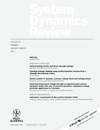
SYSTEM DYNAMICS REVIEW
Catalyzing scholarly discourse since 1985.System Dynamics Review is a premier academic journal published by Wiley, renowned for its contributions to the fields of Management of Technology and Innovation, Modeling and Simulation, and Social Sciences. With an impressive impact factor and a strong standing in various academic rankings, highlighted by its elite Q1 categorization in multiple disciplines, the journal positions itself as a vital resource for practitioners, researchers, and students alike. The journal has successfully engaged with a long tradition of scholarship, converging knowledge since 1985 and continuing to shape academic discourse through rigorous peer-reviewed articles. Researchers can access this journal through traditional subscription methods, ensuring a high-quality resource for innovative modeling approaches, strategic management insights, and in-depth analyses across social sciences. Situated in the United Kingdom, System Dynamics Review exemplifies excellence in research dissemination, making it an essential reading for anyone interested in the dynamics of complex systems and their implications for technological advancement and management strategies.
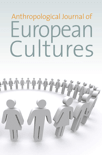
Anthropological Journal of European Cultures
Exploring the Rich Tapestry of European SocietiesAnthropological Journal of European Cultures, published by BERGHAHN JOURNALS, is a premier Open Access journal dedicated to the exploration and analysis of cultural dynamics within European societies. With an ISSN of 1755-2923 and an E-ISSN of 1755-2931, the journal has been providing a platform for critical discourse in anthropology and cultural studies since its inception in 2008. Catering to a diverse readership of researchers, professionals, and students, the journal plays a vital role in fostering a deeper understanding of European cultures through rigorous scholarship. It has garnered commendable rankings, including Q3 in Anthropology and Q2 in Cultural Studies for 2023, reflecting its growing influence and quality within the academic community. The journal is committed to Open Access since 2020, ensuring that cutting-edge research is freely available to all, thereby enhancing its reach and impact in the global discourse on culture and anthropology. With its comprehensive and interdisciplinary approach, the *Anthropological Journal of European Cultures* serves as an essential resource for advancing knowledge and promoting dialogue in these dynamic fields.

Journal of the Economic and Social History of the Orient
Charting the Course of Historical Economic and Social EvolutionThe Journal of the Economic and Social History of the Orient, published by BRILL, serves as an essential platform for researchers, historians, and social scientists interested in the economic and social dynamics of the Orient. Since its inception in 1957, this journal has contributed significantly to the understanding of historical economic structures and societal transformations, offering insights that engage a wide academic audience. With an ISSN of 0022-4995 and an E-ISSN of 1568-5209, the journal maintains a reputation for quality scholarship, as reflected in its Q2 ranking in History and notable standings in the fields of Sociology and Economics. Although it is not an open-access journal, it ensures accessibility to vital research through institutional subscriptions. By exploring diverse topics within the realms of economics, sociology, and history, the journal plays a crucial role in fostering academic discourse and enhancing knowledge regarding the complex historical narratives of the Orient.
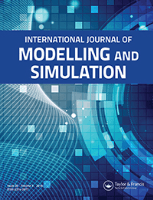
INTERNATIONAL JOURNAL OF MODELLING AND SIMULATION
Pioneering Insights in Engineering and Data AnalysisINTERNATIONAL JOURNAL OF MODELLING AND SIMULATION, published by Taylor & Francis Inc, stands as a leading platform for the dissemination of high-quality research in the fields of modeling and simulation across various engineering disciplines. With an ISSN of 0228-6203 and an E-ISSN of 1925-7082, this esteemed journal has been actively contributing to the academic community since 1996. It enjoys a commendable reputation, ranked in Q2 across numerous categories including Electrical and Electronic Engineering, Engineering (miscellaneous), and Modeling and Simulation, reflecting its vital presence in the academic landscape. The impact factor has not been specified, but its impressive Scopus rankings demonstrate its significance, particularly in General Mathematics and various engineering fields, placing it within the 83rd percentile and above. With a broad scope that encompasses industrial applications and theoretical advancements, the journal aims to foster innovations that drive progress in technology and data analysis. While it is a traditional subscription-based journal, researchers and practitioners are highly encouraged to submit their findings to contribute to the ongoing dialogue in this dynamic field, making it a valuable resource for both established experts and aspiring scholars.

Annual Review of Anthropology
Connecting Cultures Through Comprehensive ReviewsAnnual Review of Anthropology is a premier journal published by Annual Reviews, dedicated to providing comprehensive and authoritative reviews in the field of anthropology. Established with the goal of synthesizing essential research findings, this influential publication not only shapes contemporary anthropological discourse but also facilitates interdisciplinary dialogue within the broader realm of social sciences and cultural studies. With an impressive impact factor that places it in the Q1 category across multiple classifications, including Anthropology and Arts and Humanities, this journal is highly regarded by researchers and academics alike. The Annual Review of Anthropology has been a trusted resource for critical insights and transformative ideas, helping to advance the understanding of human societies from 1980 to the present. Although it does not offer open access, access to its articles is available through various academic institutions, ensuring that both seasoned scholars and students can benefit from its wealth of knowledge. With a Scopus ranking placing it in the top percentiles for relevant subjects, this journal is essential reading for anyone looking to stay at the forefront of anthropological research.
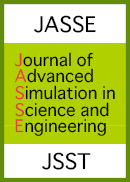
Journal of Advanced Simulation in Science and Engineering
Driving Innovation in Science and Engineering Through SimulationJournal of Advanced Simulation in Science and Engineering, published by the Japan Society for Simulation Technology (JSST), stands as a pivotal platform in the dynamic field of simulation technology, focusing on cutting-edge research and applications in science and engineering. With the ISSN and E-ISSN of 2188-5303, this journal aims to disseminate high-quality research that drives innovation and enhances understanding among practitioners, academics, and students alike. As an essential resource for those engaged in simulation methodologies, it explores a wide range of topics, including but not limited to computational modeling, virtual simulations, and their applications across various engineering disciplines. The journal is indexed in prestigious databases, aiming for a strong impact factor that reflects its commitment to scholarly excellence and relevance. Its open access policy further facilitates wider dissemination and accessibility of research findings, thereby fostering greater collaboration and advancement in the field. Researchers and professionals are encouraged to contribute their findings and insights, establishing the Journal of Advanced Simulation in Science and Engineering as a leading authority in advancing simulation technologies for future applications.